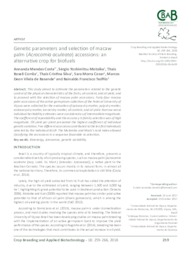Genetic parameters and selection of macaw palm (Acrocomia aculeata) accessions: an alternative crop for biofuels.
Genetic parameters and selection of macaw palm (Acrocomia aculeata) accessions: an alternative crop for biofuels.
Author(s): COSTA, A. M.; MOTOIKE, S. Y.; CORRÊA, T. R.; SILVA, T. C.; COSER, S. M.; RESENDE, M. D. V. de; TEÓFILO, R. F.
Summary: This study aimed to estimate the parameters related to the genetic control of the physical characteristics of the fruits, oil content, and oil yield, and to proceed with the selection of macaw palm accessions. Forty-four macaw palm accessions of the active germplasm collection of the Federal University of Viçosa were collected for the evaluation of epicarp dry matter, pulp dry matter, endocarp dry matter, kernel dry matter, oil content, and oil yield. Narrow-sense individual heritability estimates were considered as of intermediate magnitude. The coefficient of repeatability and the accuracy in family selection was of high magnitude. Oil yield per plant presented the highest coefficient of individual genetic variation. Five different accessions contributed to the ten first individuals selected by the individual BLUP. The Mulamba and Mock?s rank index allowed classifying the accessions in a sequence favorable to selection.
Publication year: 2018
Types of publication: Journal article
Unit: Embrapa Forestry
Observation
Some of Embrapa's publications are published as ePub files. To read them, use or download one of the following free software options to your computer or mobile device. Android: Google Play Books; IOS: iBooks; Windows and Linux: Calibre.
Access other publications
Access the Agricultural Research Database (BDPA) to consult Embrapa's full library collection and records.
Visit Embrapa Bookstore to purchase books and other publications sold by Embrapa.

